Features
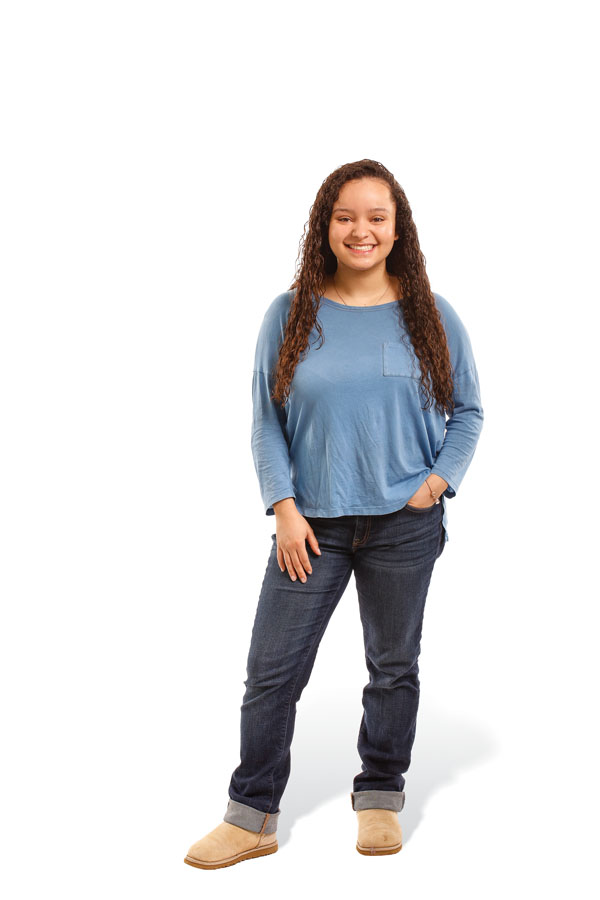
Yareni Sime ’18
Hometown: Brooklyn, New York
Majors: Public health; psychology
Scholarships: Cathy E. Minehan and E. Gerald Corrigan Endowed Scholarship; Brady Scholars Program; Susan B. Anthony Scholarship
Yareni Sime ’18 was undecided on a major when she arrived on the River Campus. She loved the freedom of the Rochester Curriculum and quickly became involved in numerous activities.
She researched infant feeding practices among local Latinas. She interned at a community church. She studied abroad in England and Jamaica.
She also joined the Spanish and Latino Students’ Association (SALSA), became a student supervisor at Rush Rhees Library, and a trainer for Students Wanting Alcohol Responsibly Monitored (SWARM), where she teaches students how to be active bystanders while hosting events where alcohol is served.
“She’s tenacious in her drive to succeed,” says Melissa Raucci, Sime’s academic advisor at the David T. Kearns Center, where Sime has been designated a Ronald E. McNair Scholar and a Kearns Scholar. “She would come into meetings like a bolt of lightning, talking about all the things she wanted to accomplish here. Watching that energy and passion mature into a focused life objective has been quite meaningful.”
Sime says none of her accomplishments at Rochester would be possible without scholarship support. In setting up the Minehan-Corrigan Scholarship, Cathy Minehan ’68, a University trustee, established it for students in need who are engaged in meaningful research in the social sciences, under the direction of a faculty member. The Brady Scholars Program, established by Elizabeth Pungello Bruno ’89, is used to support students in the Early Connection Opportunity program, which serves students from low-income, first-generation, or underrepresented minority backgrounds.
“Scholarship support lifts a burden off of my parents,” Sime says. “It means I’m able to focus on classwork without worrying about how to pay for school.”
Sime was a 2017 recipient of the Susan B. Anthony Scholarship, sponsored by the University’s Women’s Club and awarded to juniors who have demonstrated outstanding leadership and commitment to cocurricular activities and academic achievement. After graduation, she plans to pursue a master’s degree in public health, and ultimately, a PhD in maternal and child health.
“As a first-generation Latina woman from a working class family, Yareni is the epitome of grit and resilience,” Raucci says. “I’ll be beaming with pride when she graduates.”
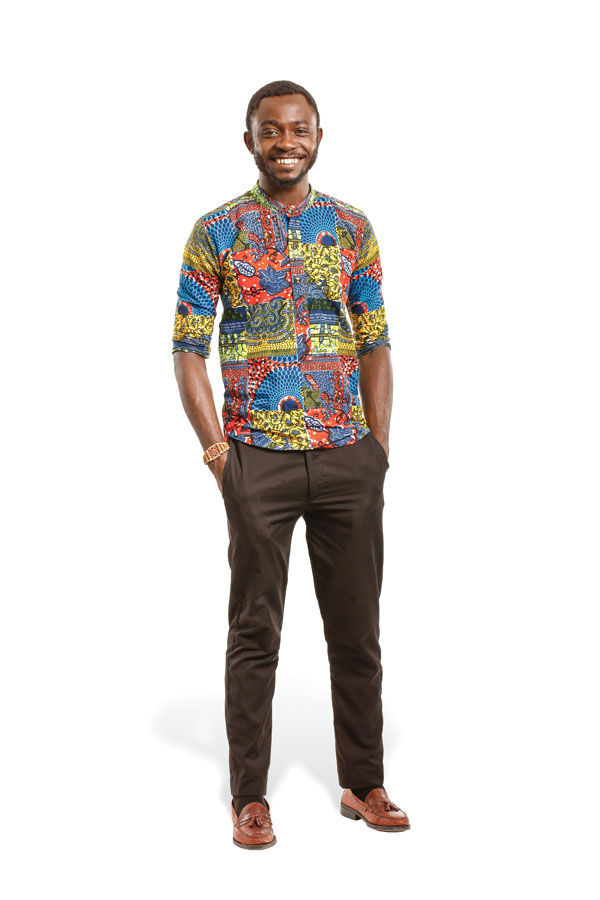
Sabastian Abelezele ’20
Hometown: Winkogo, Ghana
Major: Mechanical engineering
Scholarship: Joseph C. Dimino Endowed Scholarship; Davis United World College Scholar
Sabastian Abelezele ’20 spent five weeks last summer helping a research group study a medieval castle in his native Ghana.
“The castle was built in 1482 and is still structurally very stable,” he says. “Many have wondered what engineering and building techniques were used to build it. Our project seeks to find an answer by understanding the building sequence, reconstructing a 3-D model, and subjecting the model to different tests.”
Abelezele will return to the castle this summer. It’s the kind of research he hopes to continue in Ghana one day.
“I want to build and develop machines and tools and look at specific problems in Ghana like farming,” he says. “I want to help improve people’s lives by inventing and building new technologies.” Rochester has made him “confident and optimistic” about his future success and development.
A Davis United World College Scholar, a program designed to bring students from around the world to live and learn together, Abelezele is also a recipient of the Dimino Scholarship, established in 2012 by Joseph Dimino ’73 to assist Arts, Sciences & Engineering students with demonstrated financial need.
“My father died in 2013, and the money my mother makes as a petty trader barely provides basic needs like food, water, and electricity,” he says. “My dream of becoming an engineer is finally materializing thanks to this scholarship.’’
Abelezele chose the University because of the freedom offered by the Rochester Curriculum and the diverse international community. He has been active on campus as a member of the Pan-African Student Association, Baja SAE, and the National Society of Black Engineers. He’s also a project assistant in the office of Wendi Heinzelman, dean of the Hajim School of Engineering & Applied Sciences.
After graduation, Abelezele plans to work in the automobile or aerospace industry before pursuing graduate school.
“What I find most exceptional about Saba is his tenacity,” says Sandra Turner, special assistant to the dean and Abelezele’s mentor. “With determination, he has risen to each challenging task.”
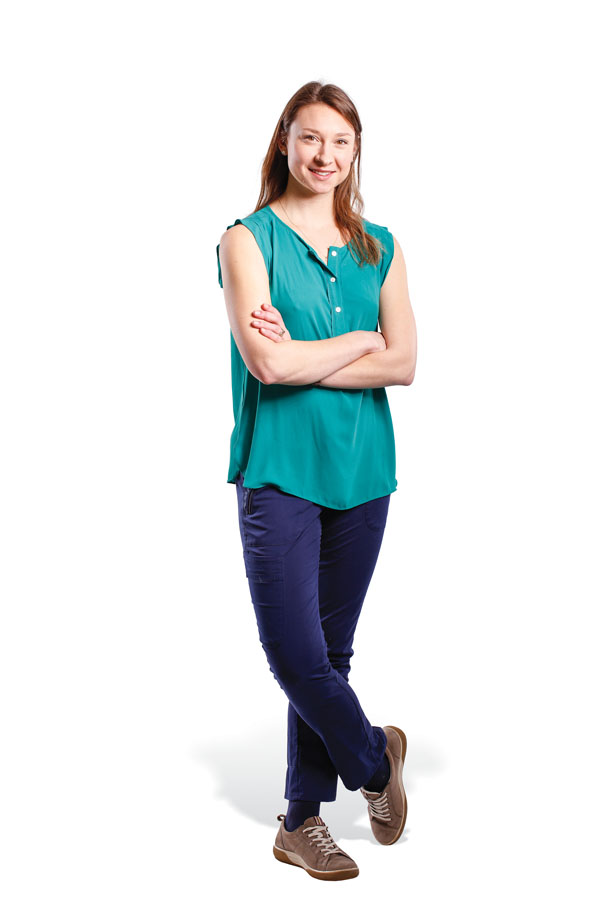
Kaitley Wozer ’18N
Hometown: Buffalo, New York
Program: Accelerated Bachelor’s Program for Non-Nurses, School of Nursing
Scholarship: McLouth Scholarship Fund
Earning a McLouth Scholarship didn’t just set Kaitley Wozer ’18N on her preferred course—it quickened the pace.
“It means I can be an excellent nurse, and be one soon,” she says. “I can start a family sooner than if I had more debt to pay.”
The McLouth Scholarship was established in 2002 with a gift from the estate of Charles McLouth III, a strong supporter of the School of Nursing, among other units in the University.
“Without it, I wouldn’t be at this school,” Wozer says.
She chose Rochester’s nursing school because of its strong reputation, positive reviews from current and former students, and the chance to start her new career in a short amount of time.
“I knew I was academically up for the rigor, and I absolutely love and identify with the school’s motto, Meliora,” she says.
Wozer worked in virology and microbiology research labs during much of her time as a student at Hobart and William Smith Colleges, where she earned a bachelor of science degree in biology. She expected to earn a doctorate in virology and “spend my life in the lab.” But a research position in the HIV/AIDS field gave her a new perspective—and a new goal.
“I soon realized I could do more good by working directly with people,” she says. “I began to consider patient care as a career.”
As a student in the Accelerated Bachelor’s Program for Non-Nurses, Wozer will earn a fully accredited bachelor of science degree in nursing in just 12 months.
She plans to seek a job at Strong Memorial Hospital after she graduates, and then to pursue a doctoral degree focusing on neonatal health care and perhaps, certifications in obstetrics and midwifery, “so that I can see mother-infant pairs through their course of needed care, especially in underserved communities.”
To Wozer, “needed care” combines the best medical care, but something else as well: “the patience and the understanding that each has their own struggles and own value.”
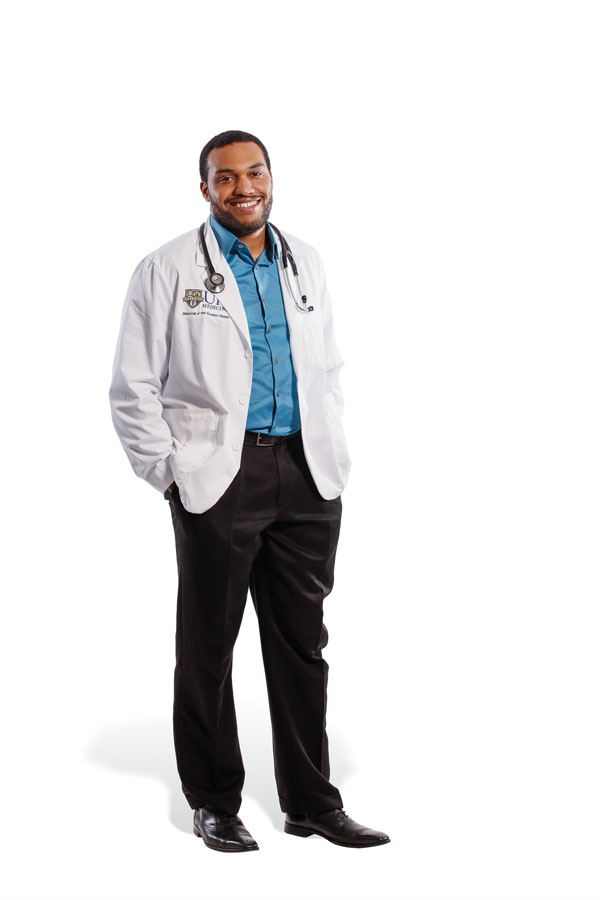
Jamal Jefferson ’17S (MBA), ’19M (MD)
Hometown: Washington, D.C.
Program: MD/MBA Program, Simon Business School in partnership with the School of Medicine and Dentistry
Scholarships: Dr. Marvin J. and Nancy Yanes Hoffman Scholarship; Nyla C. Kelson Endowment Fund; Gary P. Johnson Endowed Scholarship
Jamal Jefferson ’17S (MBA), ’19M (MD) first grew interested in health care in 2009, as he watched the Affordable Care Act (commonly known as “Obamacare”) pass through Congress.
“I decided then I wanted to be involved in health care in some capacity,” he says. “I thought about law school, public health school, medical school, or business school. My mom told me to slow down, or I’d be 50 years old by the time I finished school.”
He has a long way to go until 50, and still has accomplished a lot. After graduating from Williams College, he was accepted into Rochester’s joint MD/MBA program. “That letter changed my life,” says Jefferson, who is now in his third year of medical school.
Medical school debts can weigh on graduates decades into their careers. The burden is particularly acute for those who may also carry debt from college and may have little or no financial support from family members. Jefferson completed his MBA on the Johnson Endowed Scholarship, and is working on his MD on the Hoffman Scholarship and the Kelson Endowment Fund.
He notes that many people don’t realize financial assistance is available for professional degrees. “For those who want to pursue medicine but don’t think they can afford it, there are generous scholarship opportunities available.”
Jefferson says he chose a career in medicine “because there’s no other profession like it, and I hope to never take it for granted.” Last year, he spent time researching sickle cell traits at the National Institutes of Health and wrote a case report and editorial that was published in the Journal of Vascular and Interventional Radiology.
Jefferson says he made a lot of personal sacrifices to prepare himself for the academic rigors that lay ahead. “I left my starting position on the Williams football team my senior year to finish my premed requirements,” he says. “I studied hard for the MCAT and gained a lot of experience.”
In the end, he accomplished two very important things: “I convinced an admissions committee and, most importantly, myself, that medicine would be my life’s work.”

Andrea Velasquez ’21E
Hometown: Kingwood, Texas
Major: Applied music (flute)
Scholarships: Hamlin Family Scholarship Fund; Joseph Mariano Scholarship for Flute
Andrea Velasquez ’21E was 9 when her father was deported to Guatemala. Her mother cleaned houses to support Andrea and her brother, but the family soon lost their house and moved into a one-bedroom apartment.
“My mom had to become both parents,” Velasquez says. “But because I was the oldest sibling, I felt like I needed to grow up and become an adult figure for my younger brother.”
While becoming that adult figure, she also was able to nurture her growing interest in the flute.
While many, if not most, young musicians begin their instrument in elementary school, Velasquez didn’t start playing the flute until middle school.
“It was mandatory to sign up for fine arts, so my friends and I decided to play flute in the school band,” she says. “I didn’t like it at first, but I quickly grew to love it.”
She became president of her high school band, earned all-state musician status, and won a place in the Houston Youth Symphony.
Attending the Eastman School of Music was a dream for her. She applied in large part to work with renowned flute professor Bonita Boyd. She auditioned successfully, and two scholarships finally enabled her to be able to fulfill her dream. “I’m incredibly blessed,” she says.
Velasquez is a recipient of the Hamlin Family Scholarship and the Mariano Scholarship for Flute, both designated to enable successful applicants with financial need to be able to attend Eastman. The Hamlin Family Scholarship was established in 2016 by Mary M. and George W. Hamlin IV, and the Joseph Mariano Scholarship for Flute was established in 2007 with gifts from family and friends to honor the memory of Joseph Mariano.
“When I auditioned here, I could feel the sense of community among the students and faculty,” Velasquez says. “It was an environment I really wanted to be part of.”
She’s effusive in expressing her gratitude to her scholarship donors. But as donors know, the finest talent doesn’t always come with means, and scholarships are essential to attracting the kind of student body that helps Eastman maintain its international renown.
During her time at Eastman, Velasquez has been a key contributor to the campus community as a member of the Wind Orchestra, the Eastman School Symphony Orchestra, a woodwind quintet, and a flute quartet. She brings other assets as well.
“Andrea is filled with joy for her work and makes music with energy, passion, and commitment,” Boyd says. “She’s not only a star artistically and musically, but she’s a splendid human being.”
Ultimately, Velasquez says her greatest debt is to her mother, Rosy. “She’s my rock, the main person responsible for getting me here. She pushed me to be the best version of myself.”
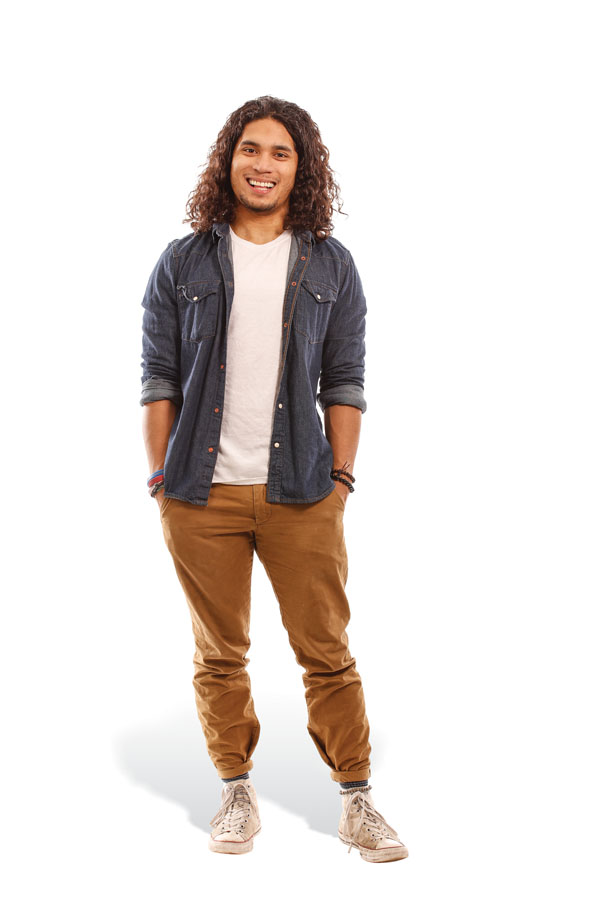
Isaiah Pule ’18
Hometown: Waianae, Hawaii
Majors: Film and media studies; business
Scholarship: Alan and Jane Handler Scholarship
Isaiah Pule ’18, who hopes to become a film producer someday, could easily find rich material in his own fascinating life.
In his youth, Pule lived in poverty and eventually was placed into foster care. He found peace and purpose by joining the Polynesian Voyaging Society, a group that explores the seas using traditional oceanic vessels such as double-hulled canoes comprised of wood, rope, and tarp. They’ve been used by Hawaiians for thousands of years.
Over the past decade, Pule has sailed through the islands of Hawaii, meeting Desmond Tutu and the Dalai Lama along the way.
He also met Jonathan Burdick, Rochester’s dean of admissions and financial aid.
Burdick was in Hawaii for a precollege readiness program, and Pule impressed him in conversations about astronomy and navigation. Pule interviewed with an admissions counselor on Halloween, dressed as Superman. He was later admitted and offered a Handler Scholarship. The University’s premier scholarship, it was established in 2007 by Rich Handler ’83, a University trustee, and his wife, Martha, to honor Rich’s parents, Alan and Jane Handler. It grants four years of total support to select students with exceptional academic promise, high financial need, leadership potential, and demonstrated mastery of complex challenges.
Although he’s 5,000 miles from home, Pule has navigated college as seamlessly as a sailboat in the Pacific Ocean. He’s a member of the Sigma Chi fraternity, plays club rugby, and works as an intern in the Advancement Communications office. Pule calls himself “humbled and grateful,” and the scholarship, life-changing.
Following graduation, he’ll pursue a master’s degree while teaching high school English in Hawaii as part of the Teach For America program. “It’s a place where I can make an immediate impact.”
Pule plans eventually to work for a film company in Los Angeles, New York City, or at home in Hawaii, making movies that illustrate the same resilience and determination he had as a youth.
He won’t forget how his scholarship set him on a course for adventure—sans sailboat—at Rochester.
“It gave me a dream of giving the same opportunity to someone in the future. Because the experience I was given must be shared and passed on.”
One student is thankful that her scholarship takes a financial burden off her parents. Another says finishing her degree with less debt means she won’t have to delay her decision to start a family. Still another is grateful that his scholarship enabled him to pursue a world-class education that will show his community back home that if he can do it, “they can as well.”
Donors fund more than 1,100 scholarships toward study at the University, an overwhelming majority of which are dedicated to students with financial need. For the students who receive the awards, the scholarships are as essential as the University’s decision to admit them: without the assistance, they’d be unable to attend.
For the University, the scholarships are no less essential, both in attracting the best available talent and in fostering a diverse student body. Accordingly, they were a focus of the $1.2 billion Meliora Challenge: The Campaign for the University of Rochester, announced during Meliora Weekend 2011. By the time the campaign, which exceeded its goal, had concluded, the University had added more than 400 endowed scholarships.
Samantha Veeder, associate dean of College enrollment and financial aid, says Rochester “is able to enroll students who are outstanding academically, while at the same time bringing geographic and socioeconomic diversity to the campus. The campus culture benefits from having such visionary, driven students living and learning together.”
Rochester Review
March–April 2018
Vol. 80, No. 4

